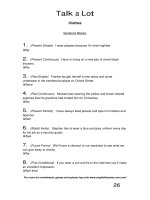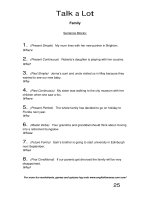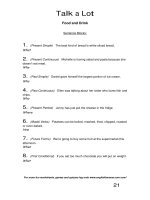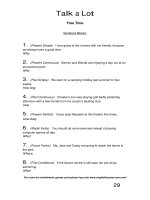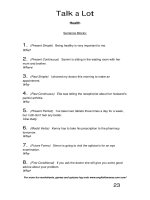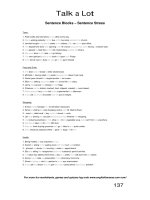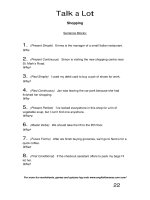talk a lot connected sentence cards sample lesson plan
Bạn đang xem bản rút gọn của tài liệu. Xem và tải ngay bản đầy đủ của tài liệu tại đây (71.4 KB, 3 trang )
Talk a Lot
How to Use
Connected Sentence Cards – Sample Lesson Plan
Activity Type:
Discovery; learn the techniques of connected speech
Level:
Elementary - Pre-Intermediate
Skills:
Vocabulary; Speaking & Listening; Pronunciation; Stress
Class Size:
Students work in pairs or small groups with a maximum of six in a
group. This lesson also works well with individual students in a one to
one situation
Time:
1 hour
Aim:
To learn the techniques of connected speech
Materials:
1 set of eight cut-up sentences per six students (or one cut-up
sentence per pair/small group, depending on the level of your
students and what they can handle!), whiteboard and pens; students
have their notebooks and pens
(Note: you could teach exactly the same content and concepts using the connected speech
templates (see p.4.1). However, the cards give a more tactile experience (which is great for
students who learn through physically doing something) and allow students to put together
the sentences and identify the content and function words, i.e. to start the whole process at
the beginning, whereas the connected speech templates do not.)
Procedure
1. Students should be in small groups – six per set of connected sentence cards. Give out the
sets of cards, with each sentence in a separate group. Students put all the cards face up on
the table. Ask them to put the words into order to make the sentences and tell you what verb
form is used, e.g. “Present Simple” or “Future Forms”.
2. One student from each group writes one (or more) of the sentences on the board. Elicit any
spelling corrections from the group. Let’s say, for example, that one of the sentences that
students have unjumbled is this one from the “Money” topic in Book 3:
Roger is paying his gas bill and electricity bill at the post office.
Different students read all the sentences aloud. Check the students’ understanding of
meaning, sentence and word stress, and pronunciation (what they naturally produce).
3. Students identify content words and move the cards up so that they stand out. The words
on the table in front of the students will look something like this:
content words:
function words:
Roger is paying his gas bill and electricity bill at the post office.
Roger is paying his gas bill and electricity bill at the post office.
For more fun worksheets, games and quizzes log onto www.englishbanana.com now!
Talk a Lot Elementary
English Banana.com
3.3
Talk a Lot
How to Use
Connected Sentence Cards – Sample Lesson Plan
4. Students identify how many syllables there are in each content word, e.g.
no. of syllables:
2
2
1
1
5
1
1
2
Roger is paying his gas bill and electricity bill at the post office.
Roger is paying his gas bill and electricity bill at the post office.
5. Students identify the strong stressed syllable in each content word of more than one
syllable. Every word in English has one strong stress, which is always on a vowel sound. See
example sentence below. Students could use a dictionary to look at the IPA stress marks, if
required. They should consider features such as suffixes, compound nouns, weak stresses,
contractions, and stress patterns. Highlight this information on the board, so that students
become aware of rules that can help them to identify word stress. Highlight patterns, e.g.
compound nouns almost always have the stress on the first syllable. (See “Focus on
Connected Speech”, sections 11-17 for more information and activities.)
(strong stressed syllable)
suffixes in bold;
no compound
nouns
st
1st
3rd
1st
1
(Rog)er is (pay)ing his gas bill and elec(tric)ity bill at the post (off)ice.
ois payin
his gas bill and electricity bill
at the post office.
all function
words here can
be weak forms;
“Roger is” could
be contracted
to “Roger’s”
6. Students identify the vowel sound of each strong stressed syllable, using symbols from the
IPA chart (see p.18.6). For example:
The sound spine of the sentence: vowel sounds on the stressed syllables of content words:
LflL
LÉfL
LôL=LfL
LfL
LfL=============L]rL==LflL
(Rog)er is (pay)ing his gas bill and elec(tric)ity bill at the post (off)ice.
ois payin
his gas bill and electricity bill
at the post office.
Practise saying the vowel sound patterns out loud with your students:
LflL
LÉfL
LôL=LfL
LfL
LfL=============L]rL==LflL
Highlight that this is the “sound spine” of the sentence. This sequence of vowel sounds is the
“distilled essence” of the spoken sentence. It’s what we need to hear if we are to understand
the sentence. For example, it’s much easier to understand the speaker if the vowel sounds
are correct but the consonant sounds are wrong, than the other way round (see example on
p.4.3).
7. Students identify how to link from one stressed syllable to the next, using the techniques of
connected speech (see p.11.3). Notice how function words are squashed and mashed up
between the strong stressed syllables. Students practise saying the sentences using
connected speech.
For more fun worksheets, games and quizzes log onto www.englishbanana.com now!
Talk a Lot Elementary
English Banana.com
3.4
Talk a Lot
How to Use
Connected Sentence Cards – Sample Lesson Plan
8. Elicit from students the following conclusions:
If a listener can’t understand your spoken English, it could be because:
a)
b)
c)
d)
e)
f)
g)
you’re saying the wrong vowel sound on a stressed syllable
you’re stressing the wrong syllable in a word
you’re stressing too many syllables in a word
you’re not stressing any syllables in a word
you’re not connecting together words in a sentence
you’re not giving stronger stress in a sentence to content words over function words
all of the above (I really hope not!)
Consolidation
Use the connected speech templates (see p.4.1) for more practice on these techniques.
They’re great for either classroom use or homework activities.
For more fun worksheets, games and quizzes log onto www.englishbanana.com now!
Talk a Lot Elementary
English Banana.com
3.5

